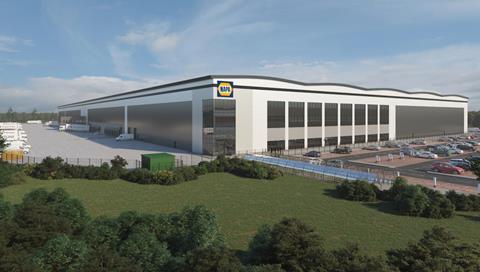
Demand for warehousing space across the country has prompted the recent development of several big units for logistics operators amid constrained supply.
Real estate developer Panattoni said it had secured permission for a speculative 417,570 sq ft shed near the M18 in Doncaster and it was confident it could find a customer:
“Having recently pre-let 630,000sq ft at Panattoni Park Rotherham [pictured], we are delighted to be bringing forward a further large speculative development in South Yorkshire,” said Dan Burn, development director at Panattoni. “Despite the economic headwinds, occupier demand remains high across the region and supply constrained, particularly of ‘big box’ warehouses over 400,000sq ft.”
St Francis Group said it had now completed a 113,641sq ft warehouse in Walsall and the unit with a broad range of sustainable features was “immediately available for occupation”.
Gareth Williams, development director at St Francis, said: “Given the prevailing levels of occupier demand in the area and the lack of supply, we are confident of announcing a letting very soon.”
And construction firm Glencar said it had completed building four warehouses totalling 116,000sq ft for St Modwen Logistics at its St Modwen Park development in Newport.
It added that its growing relationship with the park was evidence of the economic growth across the South West region.
“St. Modwen Park Newport is located in Wales’ fastest-growing city, with nearly half a million economically active people within 30 minutes’ drive time, which underpinned our decision to bring these units forward speculatively,” explained Mark Snow, senior development director at St Modwen Logistics.
The developments were all announced as a new report showed that location, proximity to a reliable electricity supply and the importance of sustainable warehousing operations, including the opportunities provided by solar energy, had all been highlighted as critical factors to supporting greener warehousing.
Tracy Clarke, business solutions manager at Linde Material Handling UK, which produced the report, said: “When we consider sustainability in logistics, our first thoughts turn to transportation. Yet according to the UK Warehousing Association (UKWA), warehousing in this country in 2021 accounted for some 566m sq ft of property – a rise of 32% over the previous six years.
“This represents a considerable carbon footprint and means that the warehousing environment has a crucial and considerable contribution to end-to-end sustainability across the supply chain,” she added.
This week, the UKWA also said the Chancellor needed to use the Spring Budget to empower warehousing businesses to drive growth, decarbonise and support the government’s levelling up agenda.
UKWA CEO Clare Bottle explained: “Warehousing is one of the fastest growing sectors in the UK, together with the wider logistics community.
“We contribute £139bn gross value added to the UK economy, with an estimated one in ten workers in the private sector employed within our industry.”













